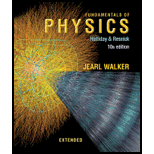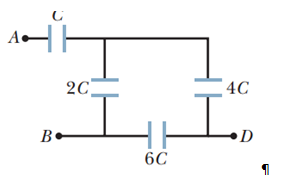
Fundamentals of Physics Extended
10th Edition
ISBN: 9781118230725
Author: David Halliday, Robert Resnick, Jearl Walker
Publisher: Wiley, John & Sons, Incorporated
expand_more
expand_more
format_list_bulleted
Concept explainers
Textbook Question
Chapter 25, Problem 58P
(a) If C = 50 μF in Fig. 25-52, what is the equivalent capacitance between points A and B? (Hint: First imagine that a battery is connected between those two points.) (b) Repeat for points A and D.

Expert Solution & Answer
Trending nowThis is a popular solution!

Students have asked these similar questions
3
Set
ба
||Axl
49.32
6b
71
Ay
22
Magnitude of A
Angle of A
24.04
Angle of -A
22
54
155.96
° (pos Ax) 204.04
° (neg Ax) 335.96
°
(pos Ax)
° (neg Ax)
115.77
° (pos Ax) 295.77
° (pos Ax)
-39
81
208.78
° (neg Ax) 28.78
°
(neg Ax)
3AA . not sure what i am getting wrong
Chapter 25 Solutions
Fundamentals of Physics Extended
Ch. 25 - Figure 25-18 shows plots of charge versus...Ch. 25 - What is Ceq of three capacitors, each of...Ch. 25 - a In Fig. 25-19a are capacitors 1 and 3 in series?...Ch. 25 - Figure 25-20 shows three circuits, each consisting...Ch. 25 - Initially, a single capacitance C1 is wired to a...Ch. 25 - Repeat Question 5 for C2 added in series rather...Ch. 25 - For each circuit in Fig. 25-21, are the capacitors...Ch. 25 - Figure 25-22 shows an open switch, a battery of...Ch. 25 - A parallel-plate capacitor is connected to a...Ch. 25 - When a dielectric slab is inserted between the...
Ch. 25 - You are to connect capacitances C1 and C2, with...Ch. 25 - The two metal objects in Fig. 25-24 have net...Ch. 25 - The capacitor in Fig. 25-25 has a capacitance of...Ch. 25 - SSM A parallel-plate capacitor has circular plates...Ch. 25 - The plates of spherical capacitor have radii 38.0...Ch. 25 - What is the capacitance of a drop that results...Ch. 25 - You have two flat metal plates, each of area...Ch. 25 - If an uncharged parallel-plate capacitor...Ch. 25 - How many 1.00 F capacitors must be connected in...Ch. 25 - Each of the uncharged capacitors in Fig. 25-27 has...Ch. 25 - In Fig. 25-28, find the equivalent capacitance of...Ch. 25 - In Fig. 25-29, find the equivalent capacitance of...Ch. 25 - Two parallel-plate capacitors, 6.0 F each, are...Ch. 25 - SSM ILW A 100 pF capacitor is charged to a...Ch. 25 - GO In Fig. 25-30, the battery has a potential...Ch. 25 - GO In Fig. 25-31, a 20.0 V battery is connected...Ch. 25 - Plot in Fig. 25-32a gives the charge q that can be...Ch. 25 - GO In Fig. 25-29, a potential difference of V =...Ch. 25 - Figure 25-33 shows a circuit section of four...Ch. 25 - GO In Fig. 25-34, the battery has potential...Ch. 25 - Figure 25-35 shows a variable "airgap capacitor...Ch. 25 - SSM WWWIn Fig. 25-36, capacitances are charged C1...Ch. 25 - In Fig. 25-37, V = 10 V, C1 = 10 F, and C2 = C3 =...Ch. 25 - The capacitors in Fig. 25-38 are initially...Ch. 25 - GO Figure 25-39 represents two air-filled...Ch. 25 - GO In Fig. 25-40, two parallel-plate capacitors...Ch. 25 - GO Capacitor 3 in Fig. 25-41a is a variable...Ch. 25 - GO Figure 25-42 shows a 12.0 V battery and four...Ch. 25 - GO Figure 25-43 displays a 12.0 V battery and 3...Ch. 25 - What capacitance is required to store an energy of...Ch. 25 - How much energy is stored in 1.00 m3of air due to...Ch. 25 - SSMA 2.0 F capacitor and a 4.0 F capacitor are...Ch. 25 - A parallel-plate air-filled capacitor having area...Ch. 25 - A charged isolated metal sphere of diameter 10 cm...Ch. 25 - In Fig. 25-28, a potential difference V = 100 V is...Ch. 25 - Assume that a stationary electron is a point of...Ch. 25 - As a safety engineer, you must evaluate the...Ch. 25 - SSM ILW WWW The parallel plates in a capacitor,...Ch. 25 - In Fig. 25-29, a potential difference V = 100 V is...Ch. 25 - Go In Fig. 25-45, C1 = 10.0 F, C2= 20.0 F, and C3...Ch. 25 - An air-filled parallel-plate capacitor has a...Ch. 25 - SSMA coaxial cable used in a transmission line has...Ch. 25 - A parallel-plate air-filled capacitor has a...Ch. 25 - Given a 7.4 pF air-filled capacitor, you are asked...Ch. 25 - You are asked to construct a capacitor having a...Ch. 25 - A certain parallel-plate capacitor is filled with...Ch. 25 - In Fig. 25-46, how much charge is stored on the...Ch. 25 - SSM ILWA certain substance has a dielectric...Ch. 25 - Figure 25-47 shows a parallel-plate capacitor with...Ch. 25 - Figure 25-48 shows a parallel-plate capacitor with...Ch. 25 - Go Figure 25-49 shows a parallel-plate capacitor...Ch. 25 - SSM WWWA parallel-plate capacitor has a...Ch. 25 - For the arrangement of Fig. 25-17, suppose that...Ch. 25 - A parallel-plate capacitor has plates of area 0.12...Ch. 25 - Two parallel plates of area 100 cm2 are given...Ch. 25 - The space between two concentric conducting...Ch. 25 - In Fig. 25-50, the battery potential difference V...Ch. 25 - SSMIn Fig. 25-51, V = 9.0 V, C1 = C2= 30 F, and C3...Ch. 25 - a If C = 50 F in Fig. 25-52, what is the...Ch. 25 - In Fig.25-53, V = 12 V, C1 = C4 = 2.0 F, C2 = 4.0...Ch. 25 - The chocolate crumb mystery. This troy begins with...Ch. 25 - Figure 25-54 shows capacitor 1 C1 = 8.00 F,...Ch. 25 - Two air-filled, parallel-plate capacitors are to...Ch. 25 - Two parallel-plate capacitors, 6.0 F each, are...Ch. 25 - GO In Fig. 25-55, V = 12 V, C1 = C5 = C6 = 6.0 F,...Ch. 25 - SSM In Fig.25-56, the parallel-plate capacitor of...Ch. 25 - A cylindrical capacitor has radii a and b as in...Ch. 25 - A capacitor of capacitance C1 = 6.00 F is...Ch. 25 - Repeat Problem 67 for the same two capacitors but...Ch. 25 - A certain capacitor is charged to a potential...Ch. 25 - Aslab of copper of thickness b = 2.00 mm is thrust...Ch. 25 - Repeat Problem 70, assuming that a potential...Ch. 25 - A potential difference of 300 V is applied to a...Ch. 25 - Figure 25-58 shows a four capacitor arrangement...Ch. 25 - You have two plates of copper, a sheet of mica...Ch. 25 - A capacitor of unknown capacitance Cis charged to...Ch. 25 - A 10 V battery is connected to a series of n...Ch. 25 - SSM In Fig. 25-59, two parallel-plate capacitors A...Ch. 25 - You have many 2.0F capacitors, each capable of...Ch. 25 - A parallel-plate capacitor has charge q and plate...Ch. 25 - A capacitor is charged until its stored energy is...
Additional Science Textbook Solutions
Find more solutions based on key concepts
A power plant that separates carbon dioxide from the exhaust gases compresses it to a density of 110kg/m3 and s...
Fundamentals Of Thermodynamics
Determine [OH], [H+], and the pH of each of the following solutions. a. 1.0 M KCl b. 1.0 M KC2H3O2
Chemistry
10.71 Identify each of the following as an acid or a base: (10.1)
H2SO4
RbOH
Ca(OH)2
HI
...
Chemistry: An Introduction to General, Organic, and Biological Chemistry (13th Edition)
How is the bilaminar embryonic disc formed? ^
Principles of Anatomy and Physiology
Nitric acid in acid rain forms when gaseous nitrogen dioxide pollutant reacts with gaseous oxygen and liquid wa...
Introductory Chemistry (6th Edition)
When working on barley plants, two researchers independently identify a short-plant mutation and develop homozy...
Genetic Analysis: An Integrated Approach (3rd Edition)
Knowledge Booster
Learn more about
Need a deep-dive on the concept behind this application? Look no further. Learn more about this topic, physics and related others by exploring similar questions and additional content below.Similar questions
arrow_back_ios
SEE MORE QUESTIONS
arrow_forward_ios
Recommended textbooks for you
 Physics for Scientists and Engineers: Foundations...PhysicsISBN:9781133939146Author:Katz, Debora M.Publisher:Cengage Learning
Physics for Scientists and Engineers: Foundations...PhysicsISBN:9781133939146Author:Katz, Debora M.Publisher:Cengage Learning
 Principles of Physics: A Calculus-Based TextPhysicsISBN:9781133104261Author:Raymond A. Serway, John W. JewettPublisher:Cengage Learning
Principles of Physics: A Calculus-Based TextPhysicsISBN:9781133104261Author:Raymond A. Serway, John W. JewettPublisher:Cengage Learning Physics for Scientists and Engineers, Technology ...PhysicsISBN:9781305116399Author:Raymond A. Serway, John W. JewettPublisher:Cengage Learning
Physics for Scientists and Engineers, Technology ...PhysicsISBN:9781305116399Author:Raymond A. Serway, John W. JewettPublisher:Cengage Learning College PhysicsPhysicsISBN:9781938168000Author:Paul Peter Urone, Roger HinrichsPublisher:OpenStax College
College PhysicsPhysicsISBN:9781938168000Author:Paul Peter Urone, Roger HinrichsPublisher:OpenStax College College PhysicsPhysicsISBN:9781285737027Author:Raymond A. Serway, Chris VuillePublisher:Cengage Learning
College PhysicsPhysicsISBN:9781285737027Author:Raymond A. Serway, Chris VuillePublisher:Cengage Learning

Physics for Scientists and Engineers: Foundations...
Physics
ISBN:9781133939146
Author:Katz, Debora M.
Publisher:Cengage Learning


Principles of Physics: A Calculus-Based Text
Physics
ISBN:9781133104261
Author:Raymond A. Serway, John W. Jewett
Publisher:Cengage Learning

Physics for Scientists and Engineers, Technology ...
Physics
ISBN:9781305116399
Author:Raymond A. Serway, John W. Jewett
Publisher:Cengage Learning

College Physics
Physics
ISBN:9781938168000
Author:Paul Peter Urone, Roger Hinrichs
Publisher:OpenStax College

College Physics
Physics
ISBN:9781285737027
Author:Raymond A. Serway, Chris Vuille
Publisher:Cengage Learning
Physics Capacitor & Capacitance part 7 (Parallel Plate capacitor) CBSE class 12; Author: LearnoHub - Class 11, 12;https://www.youtube.com/watch?v=JoW6UstbZ7Y;License: Standard YouTube License, CC-BY